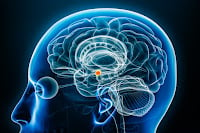Study Uncovers No Strong Evidence That Autism Is Linked With Poor Amygdala Connectivity

A systematic analysis of brain imaging data from nearly 500 individuals suggests that a prevailing neurological hypothesis of autism spectrum disorder (ASD)—theorizing that people with ASD have poorer neural connections in certain brain regions relative to those without ASD—may not be accurate. These findings were published in American Journal of Psychiatry.
“Despite enormous effort and interest, the neural basis of autism spectrum disorder … remains poorly understood,” wrote Dorit Kliemann, Ph.D., of the University of Iowa, and colleagues. They noted that the neurobiology of ASD has generally been tested piecemeal, and results have been limited by small sample sizes, the use of imaging data from multiple sites, and unclear data quality.
In their more comprehensive study, Kliemann and colleagues analyzed high-quality functional MRI data from 488 individuals aged 16 to 50 (212 with ASD and the remaining with no psychiatric illness) available via the Autism Brain Imaging Data Exchange. They examined the relative strength of the neural connections emanating from the amygdala among these individuals when they were not actively engaged in any tasks (resting-state connectivity). The amygdala processes emotions and social cues and therefore is a region of interest in ASD research.
The researchers identified no reliable evidence of atypical amygdala connectivity among the ASD group as a whole relative to those without ASD; they also observed that average variation in connectivity among individuals with ASD was about the same as the variation in those without. Kliemann and colleagues found similar results whether they examined connectivity in the amygdala as a whole or just in specific amygdala subregions.
“It is important to note that we do not conclude that amygdala [connectivity] is generally typical in autism. Instead, we conclude that the evidence for atypical [connectivity] of the amygdala in autism is weak at best, and unreliable,” the researchers concluded. They urged continued acquisition and analysis of high-quality data—“an investment worth prioritizing if we are to better understand and delineate the neurobiological substrates of autism.”
For related information, see the Psychiatric News article “Children With Autism, Fragile X Show Distinct Early Brain Changes.”
(Image: Getty Images/iStock/libre de droit)
Don't miss out! To learn about newly posted articles in Psychiatric News, please sign up here.





